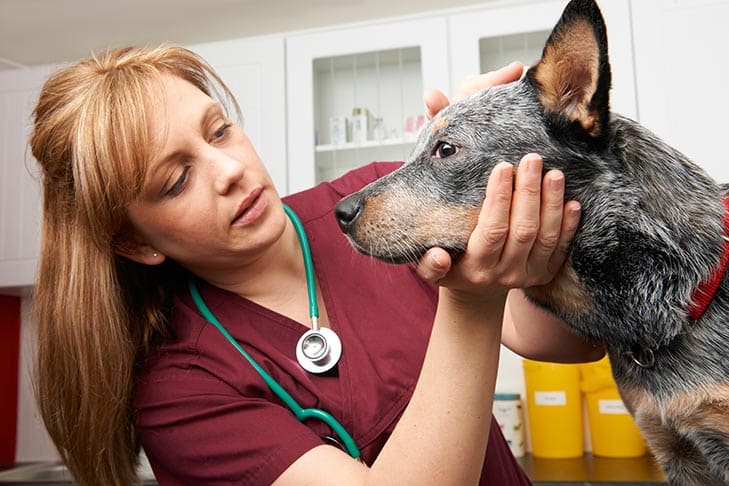Recognizing the Function of a Veterinary Behaviourist in Pet Dog Training and Well-being
The duty of a vet behaviourist is important in resolving the detailed connection between family pets and their owners. They integrate veterinary medicine with understandings from pet habits science to take on problems like aggression and stress and anxiety. Unlike standard fitness instructors, their approach concentrates on the underlying root causes of these actions. This nuanced perspective elevates concerns about the efficiency of traditional training methods and just how a deeper understanding can change pet well-being. What methods do they use to accomplish these outcomes?
What Is a Veterinary Behaviourist?
A vet behaviourist is a customized expert who concentrates on understanding and dealing with the behavioral issues of animals, specifically family pets. Their know-how combines vet medicine and pet behavior scientific research, enabling them to detect and treat a wide variety of behavior issues - dog behaviourist near me. These experts frequently hold innovative levels, such as a Master's or PhD in animal habits, and are certified by pertinent companies, ensuring they have a deep understanding of pet psychology
Veterinary behaviourists examine animals through in-depth observation and evaluation, taking into consideration elements such as genetics, atmosphere, and training background. They develop tailored therapy strategies, which might consist of desensitization techniques, positive reinforcement methods, and ecological modifications. Cooperation with pet owners is necessary, as they give guidance and support throughout the training process. Ultimately, the objective of a vet behaviourist is to enhance the well-being of the animal while fostering a harmonious relationship between family pets and their proprietors.
The Value of Recognizing Pet Actions
Recognizing animal habits is essential for both animal proprietors and specialists in the area of pet care, as it lays the foundation for effective communication and training. Recognizing how pets regard their setting and react to stimuli allows caretakers to develop a much more harmonious living situation. Insight right into behavior signs, such as body movement and vocalizations, fosters more powerful bonds between pet dogs and their proprietors. By valuing the natural instincts and requirements of various species, people can customize their training approaches to suit these factors, advertising much better discovering and teamwork. Additionally, a strong grasp of behavioral science help in identifying stress factors and potential triggers, allowing for aggressive interventions. In general, comprehending animal behavior not just enhances the well-being of animals yet likewise enriches the experiences of those that care for them, inevitably leading to much healthier, happier connections.
Common Behavioral Issues Addressed by Veterinary Behaviourists
Vet behaviourists regularly attend to common behavior concerns in animals, consisting of hostility and anxiety responses. They also concentrate on anxiety and stress and anxiety management, which can substantially affect an animal's wellness. Understanding these problems is essential for establishing effective training and treatment approaches.
Aggression and Concern Responses
While lots of pet owners might watch aggression and anxiety reactions as straightforward behavioral problems, these complicated responses commonly stem from underlying stress and anxiety or past injury. Veterinary behaviourists play a vital duty in identifying the origin of these actions, which can materialize in numerous forms, including growling, biting, or excessive fear of specific scenarios. Understanding these triggers is important for establishing effective training techniques customized to every family pet's distinct circumstances. Behaviourists employ methods such as desensitization and counter-conditioning to help pets manage their anxieties and hostility. Furthermore, they inform family pet owners concerning appropriate management techniques, stressing the importance of patience and consistency. Resolving aggressiveness and fear actions not just enhances the family pet's quality of life yet likewise reinforces the bond in between animal and owner.
Anxiousness and Tension Administration
Anxiety and stress prevail concerns that lots of family pets face, commonly arising from modifications in their environment, absence of socializing, or previous negative experiences. Vet behaviourists play a vital function in determining the underlying root causes of these issues. They use different techniques, consisting of behavior modification, desensitization, and counter-conditioning, to help animals handle stress and anxiety. In addition, they may advise ecological changes, such as developing risk-free rooms or supplying enrichment activities that advertise relaxation. Collaboration with family pet owners is necessary, as behaviourists direct them in understanding their pet dog's signals and executing reliable coping techniques. By addressing anxiousness and stress and anxiety, vet behaviourists contribute substantially to enhancing the general health and lifestyle for pets and their households.
Exactly How Vet Behaviourists Vary From Traditional Instructors
Vet behaviourists differ from standard instructors primarily in their academic backgrounds and training. While typical instructors usually concentrate on obedience and fundamental commands, vet behaviourists highlight understanding and dealing with underlying behavior concerns, incorporating medical factors to consider right into their technique. This distinct focus enables them to supply a more detailed therapy for pet dogs with complex behavioral challenges.
Education And Learning and Training Differences
Comprehending the distinction between veterinary behaviourists and traditional instructors is necessary for pet dog owners looking for effective training services. Vet behaviourists have postgraduate degrees in vet medicine, commonly adhered to by specialized training in pet behavior. This education and learning furnishes them to resolve intricate behavioral problems that may come from medical conditions or mental elements. In contrast, traditional trainers typically have accreditations from training programs that concentrate on obedience and basic commands without diving right into the underlying psychological or clinical facets. While both professionals intend to boost family pet behaviour, vet behaviourists can detect and deal with behavioural troubles holistically, integrating medical expertise right into training methods. This crucial difference highlights the relevance of picking the ideal professional based upon the family pet's certain demands.
Concentrate On Behavioral Issues
Dealing with behavioral problems calls for a nuanced technique that differentiates veterinary behaviourists from standard trainers. While typical instructors commonly concentrate on obedience and standard commands, veterinary behaviourists discover deeper into the underlying reasons of problematic practices. They employ an extensive understanding of pet psychology and habits modification methods, which are rooted in scientific research study. This expertise allows them to determine concerns coming from anxiety, worry, or aggressiveness, instead of simply addressing surface-level symptoms. On top of that, veterinary behaviourists analyze the pet dog's general wellness, considering environmental aspects and the pet's history. By integrating clinical expertise with behavioural techniques, they offer customized solutions that promote long-lasting behavioral adjustment, making certain both the pet's and owner's lifestyle are significantly enhanced.
Clinical Factors To Consider Consisted Of
While conventional fitness instructors might forget underlying medical issues, veterinary behaviourists prioritize a comprehensive evaluation of a family pet's wellness as a fundamental action in addressing behavioural problems. This approach allows them to identify prospective clinical problems that may add to unfavorable behaviours, such as stress and anxiety, pain, or neurological conditions. By incorporating clinical evaluations right into their practice, vet behaviourists can work together with vets to guarantee an alternative understanding of the family pet's wellness. Furthermore, they can suggest suitable therapies or changes to training strategies based upon medical findings. This extensive point of view differentiates veterinary behaviourists from conventional trainers, as they attend to both behavioral and health-related aspects, eventually resulting in more reliable and lasting you can try this out outcomes for pets and their proprietors.

The Refine of Collaborating With a Vet Behaviourist
Working together with a vet behaviourist involves a systematic strategy to dealing with a pet's behavior issues. The process begins with a considerable analysis, where the behaviourist gathers in-depth details about the animal's background, environment, and details behaviors that are troublesome. This commonly includes surveys, interviews with the pet dog proprietor, their website and sometimes observations of the family pet in its setting.
Adhering to the assessment, the veterinary behaviourist develops a tailored intervention plan that may include behavioral adjustment methods, training approaches, and, if essential, recommendations for clinical evaluations. board certified veterinary behaviourist. The plan is developed to be functional and attainable, guaranteeing that it fits perfectly into the family pet proprietor's way of life
Subsequent follow-up sessions are vital to check progression, change strategies, and offer support. This collaborative initiative not only intends to customize unwanted actions however also to improve the general well-being of the pet dog, making sure a harmonious partnership in between the family pet and its owner.
Enhancing Your Family pet's Lifestyle Via Behavioral Support
Enhancing an animal's lifestyle with behavioral assistance is vital for promoting a healthy and balanced and fulfilling connection in between animals and their proprietors (board certified veterinary behaviourist). Vet behaviourists play an essential duty in identifying and resolving behavioral problems that might prevent an animal's health. Through tailored approaches, they help alleviate stress and anxiety, fear, and aggressiveness, eventually advertising a more well balanced and satisfied pet
Behavioral assistance includes numerous techniques, consisting of favorable support, ecological enrichment, and socializing. By implementing these methods, owners can produce a caring setting that encourages positive habits. This not just boosts the pet's psychological health however likewise reinforces the bond in between pet dog and owner.
Furthermore, normal consultations with a veterinary behaviourist guarantee that any emerging behavior issues are promptly dealt with, avoiding escalation. In general, purchasing behavioral support is a positive strategy that greatly enriches a pet's life, resulting in improved physical and mental health results.
Often Asked Concerns
What Qualifications Do Veterinary Behaviourists Have?
Vet behaviourists typically hold a veterinary level, adhered to by specialized training in pet directory habits. Numerous likewise possess certifications from recognized companies, showing their experience in addressing animal actions problems and promoting overall pet wellness.
Can Vet Behaviourists Recommend Medication for Pets?


Vet behaviourists, possessing veterinary levels and specialized training, can indeed prescribe medication for pets. This ability allows them to deal with underlying behavior concerns properly, frequently combining pharmacological treatment with behavior alteration techniques for ideal results.
Just How Lengthy Does Behavioral Treatment Usually Take?
Behavior modification period varies significantly, commonly ranging from a few weeks to several months. Elements affecting this timeline include the animal's particular problems, uniformity of training, and the proprietor's involvement in the process.
Are Remote Examinations Readily Available With Vet Behaviourists?

Just how much Does a Vet Behaviourist Appointment Price?
The expense of a vet behaviourist assessment generally varies from $100 to $300, depending upon elements such as area, experience, and session length. Added charges might make an application for follow-up assessments or specialized services.